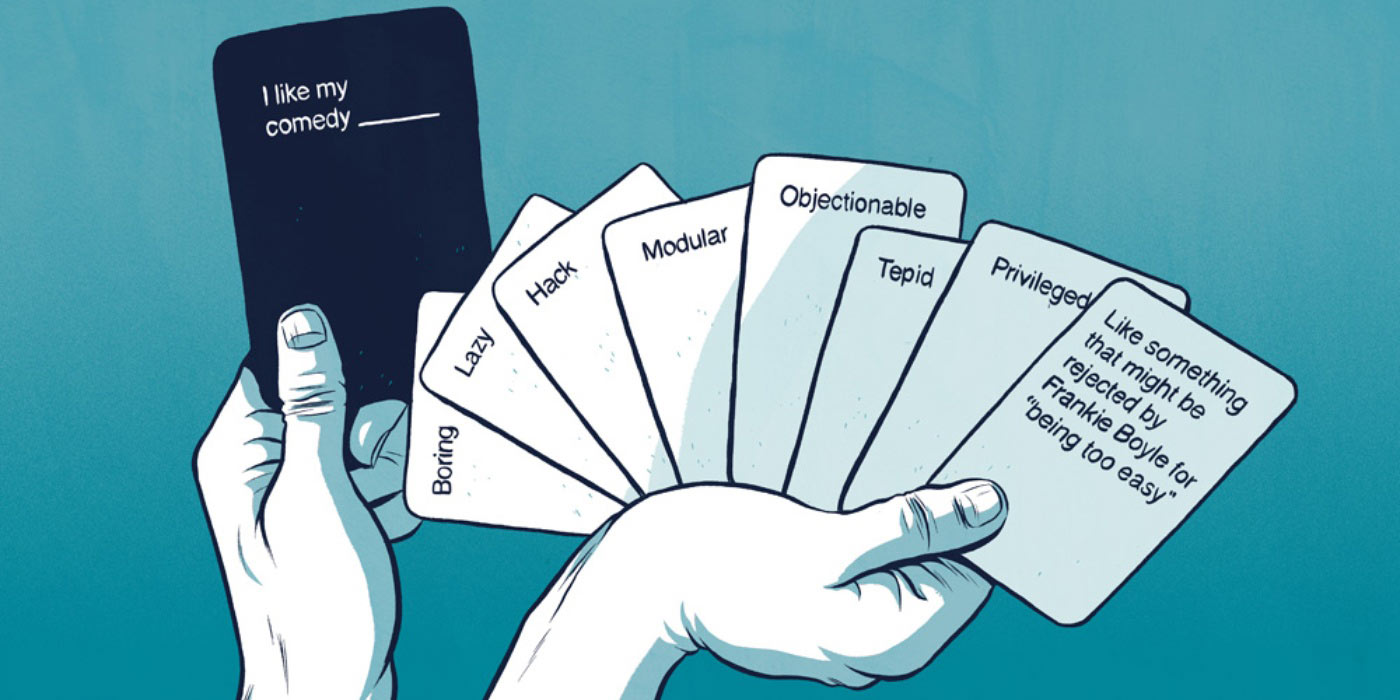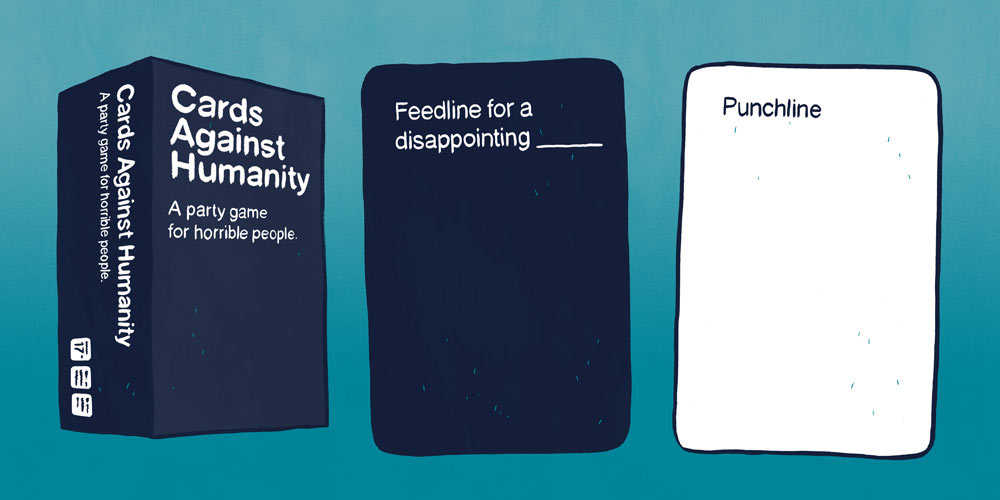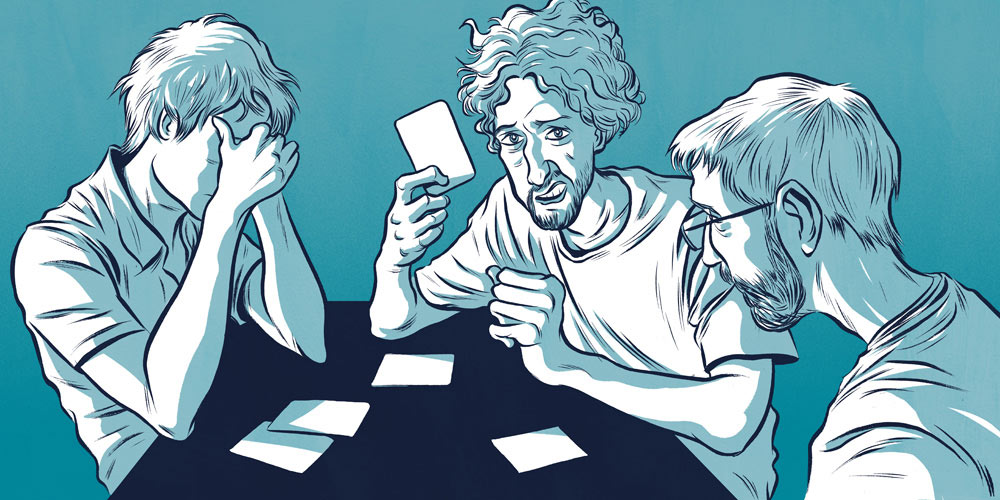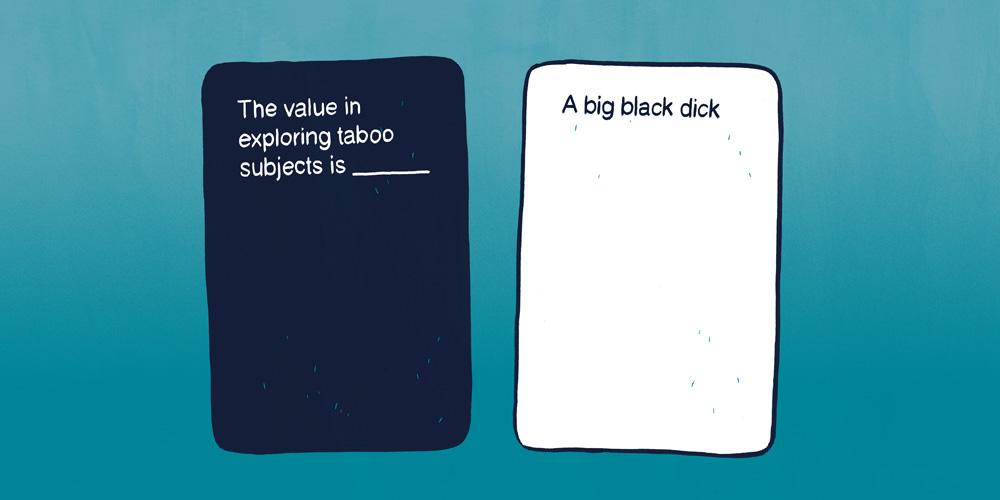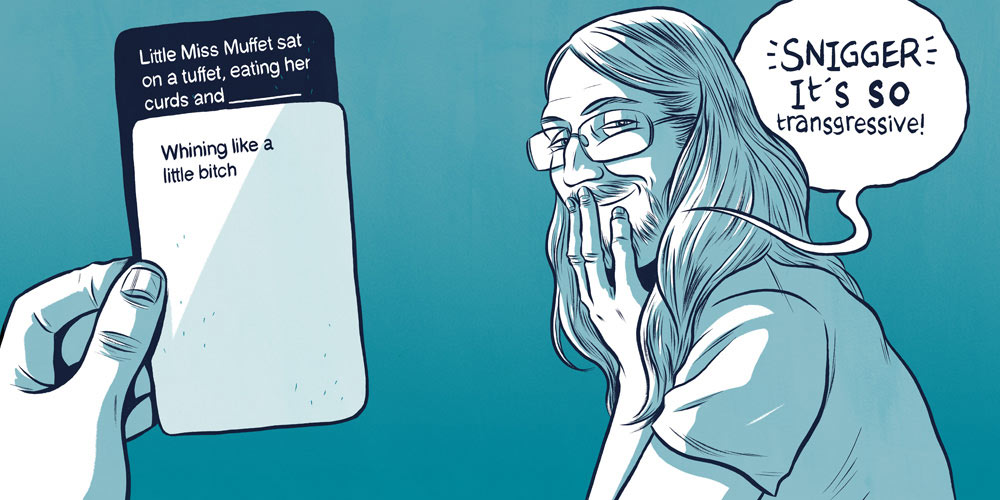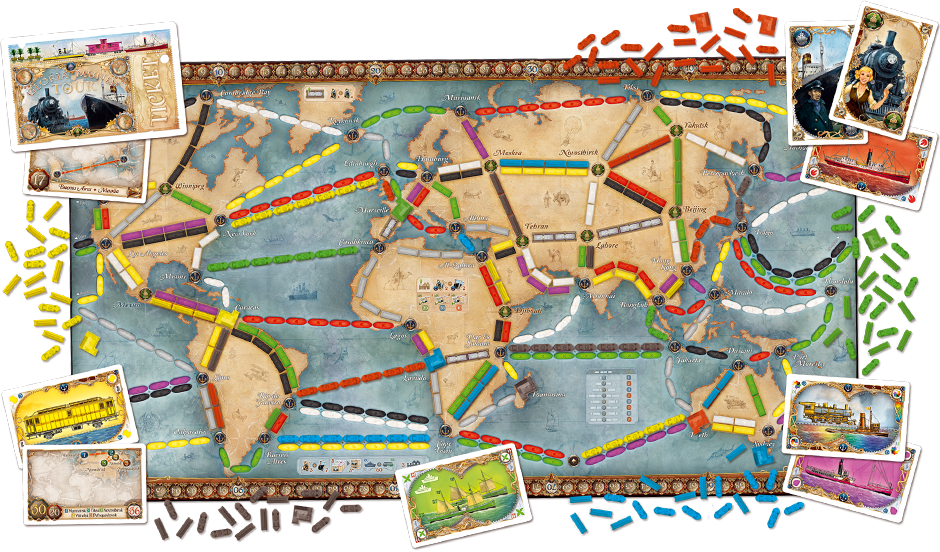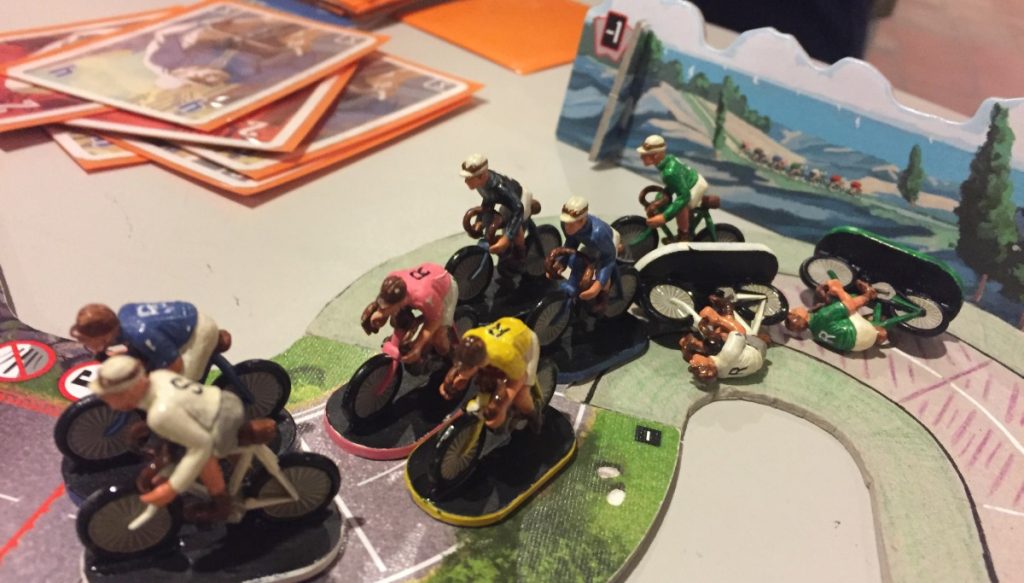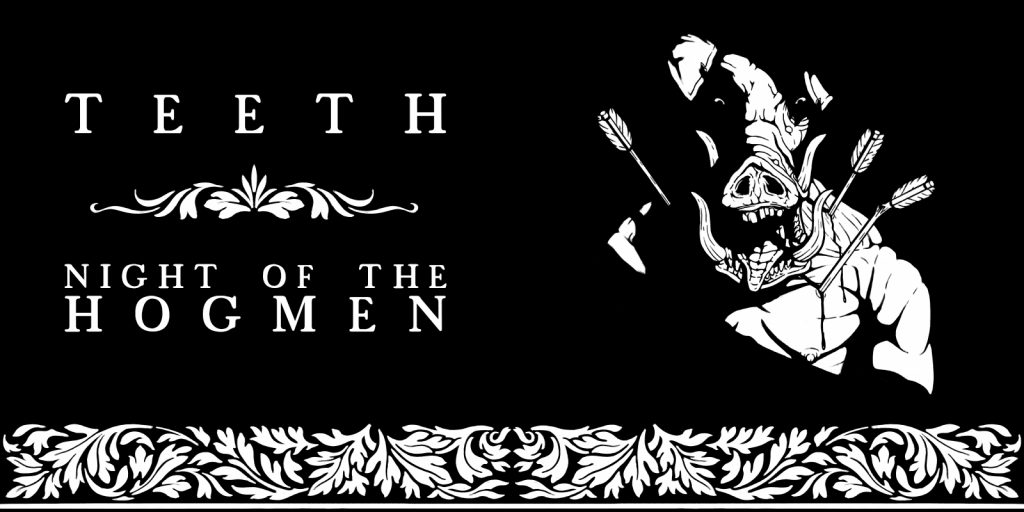Paul: I’d like to talk about Cards Against Humanity, one of our hobby’s biggest breakout successes.
The best way to describe Cards Against Humanity is “Lego for jokes”. It gives its players setups and punchlines, all ready to click together in one-step assembly. It’s easier than microwaving food or boil-in-the-bag rice. Almost no creativity is required, and because the powers of chance deal you your cards, it’s not as if you can even help the sort of combinations that present themselves, right? As well as creativity and effort, who even needs responsibility?
It’s important that we provide a trigger warning for what follows. A warning for, well, just about anything: abuse; violence; racism; rape.
If you don’t know about how Cards Against Humanity works, it’s pretty simple. It’s also a game that continues for as long as you like and, potentially, even in the way you would like. This is the good bit about it. Its rules are intentionally vague regarding how long you play for and perhaps even how you decide the winner. It’s more important, its creators suggest, to play than to win.
Drawing your first few white cards, you already know the direction this game wants you to go. While the cards you look at might well answer the question “What is Batman’s guilty pleasure?” with “Puppies,” you could just as easily offer “Child abuse.”
But we all know the direction the game wants people to go in because it subtitles itself “A party game for horrible people.” It openly, plainly, even joyfully acknowledges its content, with things like “The profoundly handicapped,” “Black people,” “Auschwitz,” “Homeless people,” and “Surprise sex” which, if you’re not versed in the term, is a euphemism for rape.
These are just a small sample of the subjects which Cards Against Humanity suggests as punchlines. You don’t need to use them, it implies; whatever you come up with was your choice. You’re the one who put those pieces together. But Cards Against Humanity still gives you the tools with which you can construct these calls and responses. It still frames and controls what happens. There’s a word for this, and that word is “enabling.”
The latest edition, which I bought to try very recently, omits some of the cards that have caused the most upset, white cards that have made punchlines of “Passable Transvestites” and “Date Rape,” hopefully because the creators realised that, for some people, “Date Rape” is not the conclusion of a joke, but the conclusion of the worst night of their life. It still includes cards that say “African Children,” “Poor People,” “The Jews” “AIDS”, “Child abuse” and “Amputees.”
I find it pretty easy to understand how some people wouldn’t find some of these funny, particularly if they recognise themselves, their experiences or someone they know as the butt of one of these “jokes”. But this isn’t the only reason why Cards Against Humanity is a bad game.
Jokes aren’t Lego. Cards Against Humanity gives you two or sometimes three pieces to snap together, and it tells you you’re done. That’s it. And you know what? Often, many of these combinations aren’t very good. They aren’t very good whether you find their subjects funny or not, offensive or not. They aren’t very good because they’re sometimes nonsensical or just weird. They aren’t very good because, in an attempt to be as shocking, controversial and offensive as possible, the designers have forgotten to… make things work. There’s very little creativity in combining cards into a joke, because the work and the structuring is done for you. It’s almost like copying someone else’s homework. There’s no life in there.
I originally wanted to talk about Cards Against Humanity in a comparison with Funemployed, a game releasing next month that uses its cards as suggestions, launch pads for ideas and improvisations, the starting point for things which, even with the same cards, can be different every time. Cards Against Humanity opens and closes the joke for you. It’s limp, passive, inert.
A punchline is also a limitation, even if it has shock value. You see it once and it may be amusing, alarming or whatever. You see it a second time and it’s less so. By giving you all its calls and responses, Cards Against Humanity seriously limits its shelf life. Its cards will become familiar. The thrill, if any, will wear off and nobody can be shouting “…it’s amputees!” with the same enthusiasm the tenth time over.
But yeah, sure, beyond the limits of this system, I (obviously) think Cards Against Humanity is a bad game because its content isn’t funny. It encourages you to make jokes about minorities, people of colour, people with disabilities, and at times I was looking at cards that made me think this was comedy from the 1920s. Does this game really think it’s edgy with its jokes about Mexicans, Mormons or Jews? It’s not just that this will offend people, it’s that it’s so damn old.
It’s what mainstream white culture has done for generations and the framework which Cards Against Humanity deliberately provides is one that encourages it further. In an age of greater awareness, where more and more people push for social change, this game is winking at you and telling you it’s okay to indulge those backward prejudices. It’s just fun, it says. It’s ironic, it says. And for the white male designers of Cards Against Humanity, who are primarily selling it to white male players, a lot of these belittling, dehumanising concepts are just a bit of fun rather than real issues that affect them.
(Oh, and jokes about sex and poop are generally fine. Sex is a valid subject and scatalogical humour, vile as some might claim it is, is nowhere near as disgusting as mocking or demeaning a group of people.)
So it’s probably not difficult to see how Cards Against Humanity was never, ever going to sit well with any of us, with a site that, while it is run by yet more white men, nonetheless deeply wants to open board gaming up to everyone. Board gaming has become dominated by people like us, and the arrival of Cards Against Humanity hardly made it friendlier to any other kind of person. The explosion of Cards Against Humanity has, I think, been downright hurtful to board gaming’s progress.
I know some people remove a lot of cards from the game before they play it. I know some people play it to try it just once (as I had to). I know some people play it in a safe space, with an awareness of boundaries. But I can’t stand it. I feel sad when I see other people playing it. I know they only want to enjoy my hobby, but seeing another copy sold, opened or played is a miserable reminder of how the damn thing is everywhere.
Our hobby isn’t new, yet it’s now growing in a way it never was before. It’s reaching more people in more places and, please God, I don’t want Cards Against Humanity to be its ambassador. I don’t want more people’s first experience of modern board, card and table gaming to be a game that says “Oops! Isn’t all this stuff just so rude? Goodness, who knows what we’ll come up with next.”
So, if you were thinking about buying Cards Against Humanity, perhaps you should think again, because your money is an encouragement, your purchase is a statement and your playing is a representation. Personally, I am not remotely okay with Cards Against Humanity representing us. I hope a lot of other people aren’t, either. I hope they say so, too.
Matt: I suspect that people don’t often question the nature of the game that they’ve actually bought. And that’s fair – asking people to analyze fun can kill parties quicker than your gay dad kills children.
The joke I just made wasn’t funny or appropriate, but crucially it remains my joke. Jokes aren’t a mechanic to get us out of trouble when we find out we’ve done something wrong, and creating a joke comes with responsibility. If the above was anything other than a nasty springboard to the point I’m currently making, I’d expect to be held to account for it. If you can’t own a joke, you shouldn’t tell it. My biggest problem with Cards Against Humanity is perhaps the same reason many find it so thrilling – it provides permission to tell jokes you don’t dare by removing all sense of responsibility.
I fundamentally don’t think that Cards Against Humanity is a funny game. The cards create jokes, but that isn’t what makes people laugh. The laughter comes from the giddy thrill of behaving in a way that we know is taboo. Your mate just said something massively racist, but it’s fine – they didn’t choose to put those cards together. And your other friend that did? Well, they didn’t really have many other cards. Besides, so many of the cards are nasty – it’s really just the nature of the game.
This removal of responsibility is frankly just weak. The appeal relies on raucous tittering about people saying things that they ‘aren’t supposed to’, but in reality you can say whatever the fuck you want.
I despise the implication that those who complain about the tone of Cards Against Humanity are approaching the topic with the mindset of a prude: I’m no stranger to making jokes about highly controversial subjects. I’ve been doing it on a podcast for almost five years. I don’t need a card game to grant me permission, but I also don’t need one to absolve me from guilt.
It’s a system designed to reliably dose players with an intoxicating sense of naughtiness. Breaking social rules gives people a buzz, but frankly there are better rules to be breaking. One of the great pleasures of games is allowing yourself to briefly play a role that’s different to your own, but I can’t help but cringe when faced with the glee of people using a deck of cards to pretend they’re the square root of Jeremy Clarkson.
Listen, I appreciate that reality is a systematically crushing gauntlet of rules designed to make your life awful. Modern life is a litany of things you aren’t allowed; a monolithic spreadsheet of sober responsibilities that’s barely cross-referenced to the things we want or need. Escapism and rebellion are natural desires that none of us should ever feel ashamed to embrace, but we’re responsible for the outlets we choose.
There are plenty of naughty things you can do that don’t rely on grinning vacantly while dicking on minorities, but perhaps these aren’t socially acceptable at dinner parties. The vast popularity of Cards Against Humanity allows for any residual guilt to be spread so much further, diluting any sense of responsibility to the point where it’s almost negligible.
I can’t help but feel that the success of the game has been virally powered by this desire to reduce those pangs of guilt: the more people who you know who’ve also bought this game, the better. You’re never expected to take responsibility for any of the things that the game makes you say, but that doesn’t solve the problem of why you own it in the first place.
It’s a question that I don’t think has any pleasant answers – only a truth that we can dilute by sharing it with others. That’s the dirty reality of Cards Against Humanity. I could tell you about better and funnier card games, but it isn’t about cards or humour or games. Cards Against Humanity is just a shoddy magic trick: smash the system, but not before you’ve covered it up with a silk handkerchief.
Ta-da! The taboos remain intact, it was all just a ruse. “Horrible” grants Cards Against Humanity more bravado than it deserves – beneath the brash and explicit surface is a system that enables behaviour that I personally find to be tepid and weak.
Quinns: I’m afraid I can’t come at this with any of Paul’s level-headedness or Matt’s social elegance. But maybe I don’t have to. What a world it would be if the creators of Cards Against Humanity could have fun laughing at AIDS, date rape and anorexia, but would deny me my own mean remarks!
I hate Cards Against Humanity because it’s shit.
If it’s part of the “face” of modern board gaming, it’s also the pervert’s moustache and smug grin. Fittingly for a game so in love with stereotypes, Cards Against Humanity is every horrible stereotype of a nerd snickering in the corner. It is every person ready to lecture you on how humour must sometimes offend, boldly dragging their Auschwitz joke up to the moral high ground. It is the manifestation of an internet asshole.
But that’s not why I hate it. I hate it because it’s shit.
Cards games have a storied history of wasting time in a very relaxed manner, offering the precious opportunity to just sit with people. These are the happy lowlands where we find Cards Against Humanity. This is where you have to judge it: against such flexible, high-capacity games as Skull or Wits & Wagers.
What we’ve got here is a relaxed card game with the very real possibility of offending people from all sorts of walks of life. This game had one job, and it failed.
One of two things happens when you buy Cards Against Humanity. One: you’ve got a game where, if new people want to join in, one of the cards might upset them. That’s miserable. To fix this you could try and prune all the offensive cards out beforehand, but it’s no less depressing to imagine someone hunched over a coffee table trying to make their purchase function as a normal game. Or two: you could only play the game with close friends who you know well. Secretly, though, that’s just as terrible. You bought a game you can only ever play with your coolest of cool buddies who don’t get worked up about this kind of thing.
And when you finally get it to the table? It can’t offer the giggle-laced panic of Pictomania, the actual wit of Funemployed, the absurdity of Telestrations. It can offer a limitless stream of pseudo-jokes, lacking either player creativity or the guiding hand of a designer.
Don’t get me wrong. The idea of someone arriving at their very first game night and assuming that the table gaming scene is this insensitive upsets me. But even worse is the thought that someone might sit down to play Cards Against Humanity, and assume the entire hobby is this boring.
Illustrations by the amazing Tom Humberstone.
Some simple card games we recommend instead!
Skull offers the most game in the simplest rules. The Metagame is Cards Against Humanity for the clever kids. Monikers is just very, very funny.
And some party games, too:
Two Rooms and a Boom has a print’n’play that’s free, just like CaH. Pictomania is a ton of fun. Telestrations is a drawing game you can make as rude as you want. Spyfall is amazing and lands this June.

